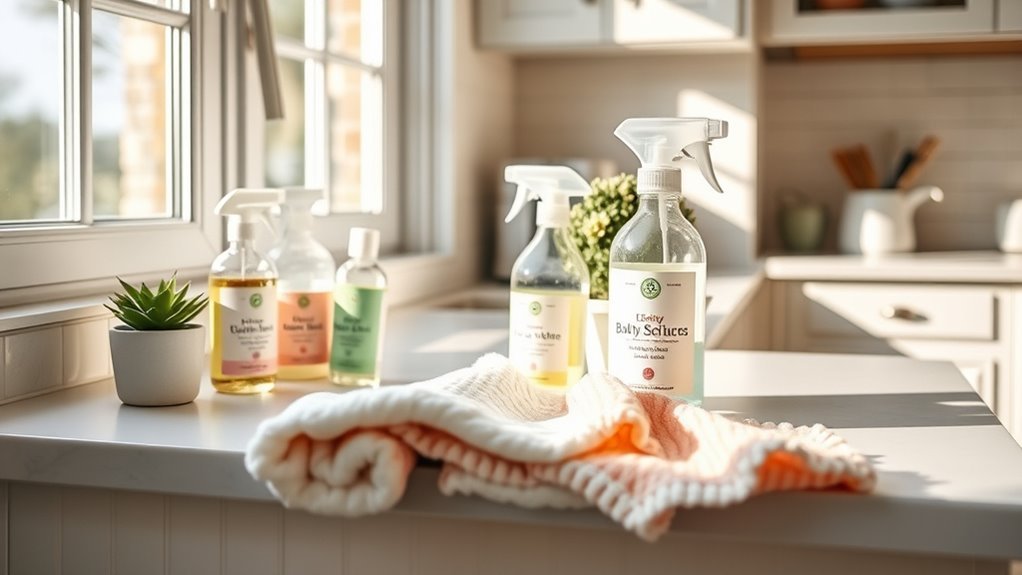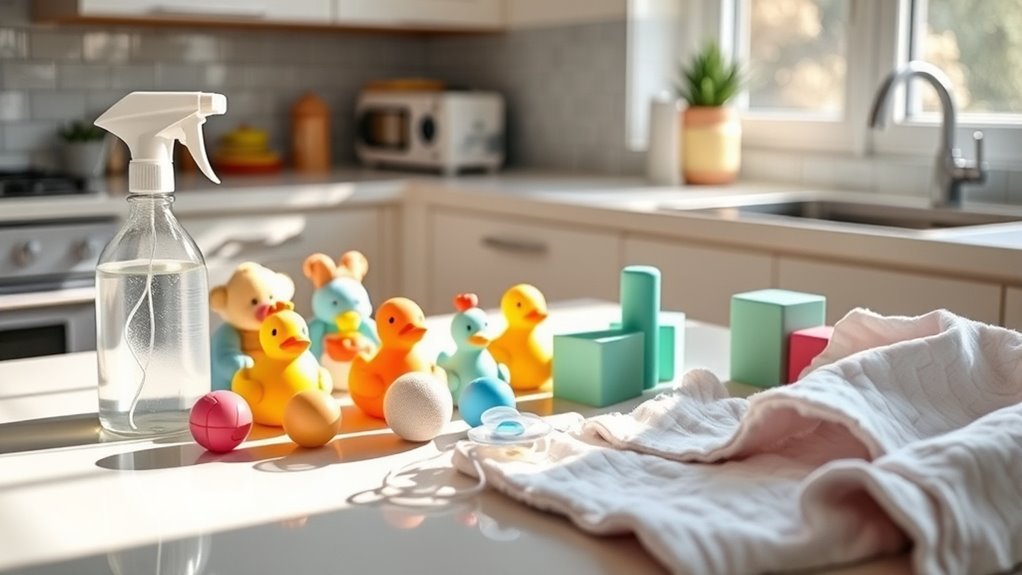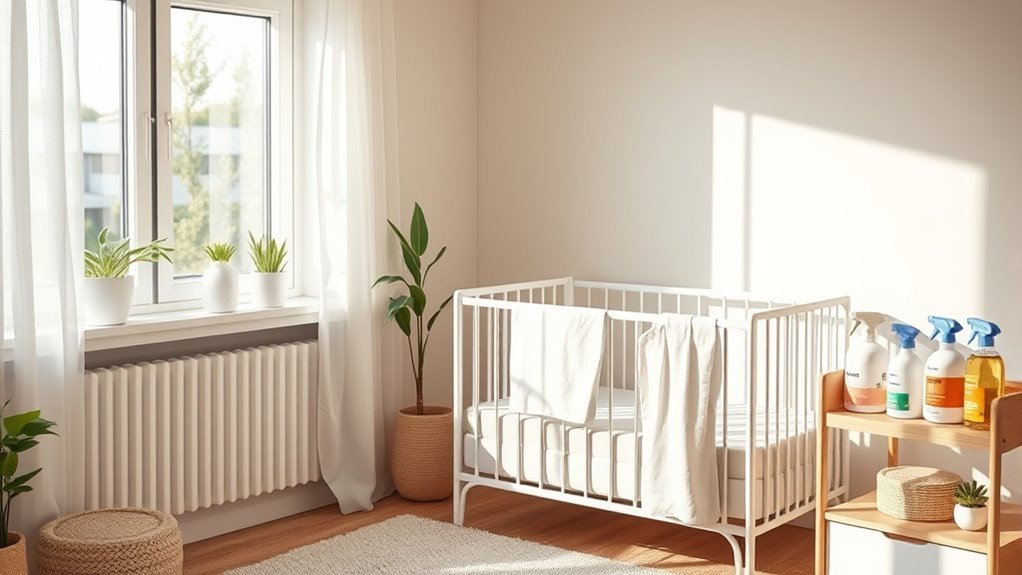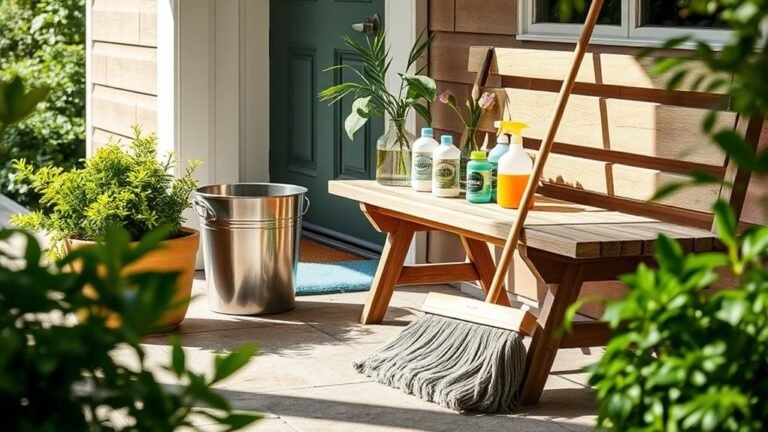Cleaning Tips for Homes With Newborns
You’ll want to use baby-safe, eco-friendly cleaning products free from harsh chemicals to keep your home healthy. Establish a regular routine focusing on high-touch areas and sanitize toys weekly with gentle solutions. Maintain good indoor air quality by ventilating and controlling humidity. Clean feeding spaces and baby clothes carefully, and handle spills promptly with non-toxic cleaners. Keep your space organized and safe from hazards. With the right approach, you can create a comfortable environment that supports your newborn’s wellbeing and comfort.
Choosing Baby-Safe Cleaning Products

Since your newborn’s immune system is still developing, you’ll want to choose cleaning products that are free from harsh chemicals and toxins. Opting for eco friendly options not only protects your baby but also supports a healthier environment, giving you the freedom to create a safe space without compromise. Look for fragrance free choices to avoid irritating your baby’s sensitive skin and respiratory system. These products often use natural ingredients that clean effectively without harmful residues. You don’t have to sacrifice cleanliness for safety—selecting the right products means you can maintain a fresh, healthy home where your newborn can thrive. By prioritizing baby-safe, eco conscious cleaning solutions, you take control of your environment, ensuring both safety and peace of mind for your growing family.
Establishing a Regular Cleaning Routine
Choosing the right cleaning products is just the first step in keeping your home safe for your newborn. To truly protect your little one, you need to establish a regular cleaning routine that fits your lifestyle without feeling restrictive. Create a cleaning schedule that balances thoroughness with simplicity, focusing on high-traffic areas and surfaces your baby frequently touches. Consistency is key—not perfection. Prioritize newborn safety by cleaning floors, changing areas, and sleeping spaces daily, and tackle less critical zones weekly. This approach frees you to enjoy time with your baby while maintaining a healthy environment. Remember, your cleaning routine should support your freedom and peace of mind, making your home a safe haven without overwhelming your day.
Sanitizing Baby Toys and Accessories

You’ll want to use safe cleaning solutions that won’t harm your baby when sanitizing their toys and accessories. Keep in mind the material of each item, as some need gentler care than others. Also, knowing how often to clean these items helps keep your baby healthy without overdoing it.
Safe Cleaning Solutions
How often should you sanitize your baby’s toys and accessories to keep them safe? Ideally, you’ll want to clean them at least once a week, or more often if they’re frequently handled or dropped. When choosing safe cleaning solutions, opt for eco friendly options that use natural ingredients. These solutions avoid harsh chemicals, ensuring your little one isn’t exposed to toxins. Simple mixtures like diluted vinegar or gentle castile soap work wonders and are easy to make at home. Just rinse thoroughly afterward to remove any residue. This way, you maintain a clean environment without compromising your baby’s health or your commitment to sustainability. Keeping things simple and safe gives you the freedom to focus on what really matters—your baby’s well-being.
Toy Material Considerations
Different toy materials require specific cleaning approaches to keep them safe and intact. When deciding between plastic vs wood toys, remember plastic is usually dishwasher-safe or can be wiped down with a mild detergent, making sanitation quick and easy. Wood toys, however, need gentler care—avoid soaking them as moisture can cause warping or cracking. Instead, wipe them with a damp cloth and dry immediately. For toys made from natural fibers like cotton or wool, hand washing with gentle soap is best to maintain softness and prevent damage. Knowing these distinctions lets you keep your baby’s playthings clean without sacrificing their quality or safety, giving you the freedom to focus on what matters most—your little one’s wellbeing and happiness.
Cleaning Frequency Guidelines
Although it can be tempting to clean baby toys and accessories constantly, establishing a regular cleaning schedule is key to maintaining a healthy environment without feeling overwhelmed. For most items, frequency recommendations suggest washing soft toys weekly and plastic toys at least once every two weeks. You can adjust this based on how often your baby uses them and if they’ve been in contact with dirt or saliva. Keep a simple cleaning schedule to avoid burnout—like washing bath toys after each use and sanitizing pacifiers daily. This way, you protect your newborn without feeling tethered to endless chores. Remember, sticking to practical cleaning schedules gives you freedom to enjoy time with your little one, knowing their toys and accessories stay safe and hygienic.
Maintaining Clean Air Quality Indoors

Since newborns are especially sensitive to airborne irritants, keeping your home’s air clean is essential for their health. You can take control by investing in effective air purification systems that filter out dust, allergens, and pollutants. Choose devices with HEPA filters to capture tiny particles that can irritate your baby’s delicate lungs. Alongside air purification, managing humidity control is key. Aim for indoor humidity levels between 40-60% to prevent mold growth and reduce dust mites. Using a humidifier or dehumidifier as needed helps maintain this balance, creating a comfortable environment for your newborn. Regularly ventilate your home by opening windows when weather permits, allowing fresh air to circulate freely. These steps give you the freedom to guarantee your baby breathes easy every day.
Washing Baby Clothes and Linens Properly
When caring for your newborn, washing their clothes and linens properly is essential to prevent irritation and infection. Choose detergent types that are gentle and free of dyes or fragrances, as harsh chemicals can upset your baby’s sensitive skin. Opt for detergents labeled hypoallergenic or designed specifically for infants. Pay attention to washing temperatures: warm water around 40°C (104°F) is usually effective for cleaning while being safe for delicate fabrics. Avoid very hot water unless you need to sanitize heavily soiled items, as it can wear out fabrics faster. Always rinse thoroughly to remove detergent residue. By selecting the right detergent types and washing temperatures, you guarantee your baby’s clothes and linens stay clean and comfortable, giving both of you freedom to focus on what truly matters—bonding and growth.
Cleaning and Disinfecting Feeding Areas
Keeping feeding areas clean and disinfected is essential to protect your newborn from harmful germs. You’ll want to focus on feeding area organization to minimize bacteria buildup and make cleaning easier. Regularly wipe down surfaces with baby-safe disinfectants, and don’t forget to clean bottles, nipples, and utensils thoroughly after each use.
| Task | Frequency | Recommended Method |
|---|---|---|
| Surface Cleaning | After each feeding | Use baby-safe disinfectant |
| Bottle Sanitizing | After every use | Boil or use sterilizer |
| Utensil Cleaning | After every use | Wash with hot soapy water |
Managing Pet Hygiene Around Newborns
Although pets bring joy and comfort, you’ll need to manage their hygiene carefully to protect your newborn from potential allergens and germs. Regular pet grooming is essential—not only does it keep your furry friend clean, but it also reduces shedding and dander that can irritate your baby’s sensitive skin and lungs. Make a habit of bathing your pet and brushing them outdoors to minimize indoor mess. For odor control, use pet-safe products and maintain clean bedding and play areas. Keep your pet out of the nursery, especially during feeding and sleep times, to limit exposure. By balancing your love for pets with smart hygiene practices, you’ll create a safe, fresh environment where your newborn can thrive without unnecessary restrictions on your family’s freedom and comfort.
Organizing and Decluttering for Safety
Since a cluttered space can easily become a hazard, organizing and decluttering your home is essential for your newborn’s safety. Creating clutter free zones lets you implement baby proofing strategies effectively, giving you peace of mind while enjoying your freedom. Start by clearing floors and pathways to avoid tripping hazards. Designate specific storage for toys and baby gear to keep them off surfaces. Secure cords and small objects out of reach, reducing choking risks. Regularly sort through items to donate or discard what’s unnecessary. Finally, keep cleaning supplies locked away in a dedicated cabinet to prevent accidents. By maintaining a tidy, well-organized environment, you make your home safer and more comfortable for both you and your little one.
Handling Spills and Stains Immediately
When spills happen, you’ll want to act fast to prevent stains and keep your baby’s environment safe. Using gentle, non-toxic cleaners guarantees you’re not exposing your newborn to harmful chemicals. Knowing simple stain removal tricks can save you time and keep your home spotless.
Quick Response Importance
If you want to keep your home safe and hygienic for your newborn, handling spills and stains immediately is essential. Quick response strategies help prevent stains from setting and reduce the risk of germs spreading. When you act fast, you maintain a cleaner environment, giving you more freedom to focus on bonding with your baby rather than stressing over messes. Here are some emergency cleaning tips to keep in mind:
- Keep a kit with wipes, cloths, and mild cleaners handy.
- Blot spills instead of rubbing to avoid spreading.
- Use cold water for protein-based stains like milk or formula.
- Clean up sticky substances quickly to prevent attracting insects.
- Dispose of soiled materials immediately to avoid odors.
Mastering these quick response strategies will make your home safer and your life easier.
Safe Cleaning Solutions
Although quick action is essential, choosing safe cleaning solutions is just as important to protect your newborn’s sensitive skin and respiratory health. When spills and stains happen, reach for eco friendly alternatives made from natural ingredients. These options minimize harsh chemicals that could irritate your baby or linger in the air. You don’t have to sacrifice effectiveness for safety—many natural solutions clean thoroughly without toxic fumes. Keep a small spray bottle with a simple mix of vinegar, water, and a few drops of essential oil handy for immediate use. This way, you can tackle messes swiftly while maintaining a healthy environment. By opting for gentle, natural ingredients, you create a space where your little one can thrive freely without unnecessary exposure to harmful substances.
Stain Removal Techniques
Choosing safe cleaning solutions is just one part of keeping your home fresh and healthy for your newborn. When it comes to stain removal, handling spills immediately is key to preventing stubborn marks. Different fabric types react differently, so knowing what you’re dealing with helps you act fast and smart. Here’s how to take control:
- Blot spills gently without rubbing to avoid spreading the stain
- Use mild, baby-safe detergents suited for delicate fabrics
- Rinse with cold water for protein-based stains like milk or formula
- Test any cleaning solution on a hidden spot to check fabric compatibility
- Air-dry fabrics instead of using heat, which can set stains permanently
Frequently Asked Questions
How Often Should I Deep Clean My Newborn’S Nursery?
You should deep clean your newborn’s nursery about once a month to keep things fresh and safe. Establish a cleaning schedule that fits your lifestyle, balancing nursery organization with your daily routine. This way, you won’t feel overwhelmed, and the space stays comfy for your baby. Remember, freedom comes from having a plan that works for you, so adjust the schedule as needed to keep everything tidy without stress.
Can Essential Oils Be Used Safely Around Newborns?
You’ll want to be cautious with essential oil safety around your newborn. Many oils can irritate their sensitive skin or affect newborn health negatively, so it’s best to avoid diffusing strong scents in their room. If you’re set on using them, opt for mild, diluted oils and keep the space well-ventilated. Always consult a pediatrician first to guarantee your little one stays safe while you enjoy the freedom of a fresh-smelling home.
What Are Safe Alternatives to Bleach for Disinfecting?
You don’t need a chemical hurricane to keep things spotless! Instead of bleach, grab vinegar solutions—they’re like nature’s tiny superheroes, zapping germs without the harsh fumes. Hydrogen peroxide is another gentle warrior, tackling bacteria while letting you breathe easy. You’ll feel the freedom of a clean home without the sting of strong chemicals, so you can protect your space and your peace of mind. Simple, safe, and totally effective!
How to Clean Baby Car Seats Without Damaging Materials?
When cleaning baby car seats, you’ll want to protect those delicate car seat materials by avoiding harsh chemicals. Stick to gentle cleaning solutions like mild soap mixed with warm water. Use a soft cloth or sponge to wipe down surfaces, and always check your car seat’s manual for specific instructions. Let it air dry completely to keep everything fresh without any damage—this way, you’re free to keep your baby’s ride clean and safe without worry.
Should I Clean My Newborn’S Pacifiers Differently Than Toys?
Yes, you should clean your newborn’s pacifiers differently than toys. Pacifier sterilization methods like boiling, steam sterilizers, or UV sterilizers are essential to kill harmful germs since pacifiers go directly in the mouth. Toys, on the other hand, usually follow toy cleaning guidelines—wiping with mild soap and water or using dishwasher-safe options. Keeping these methods separate lets you protect your baby’s health while enjoying more freedom in your cleaning routine.






